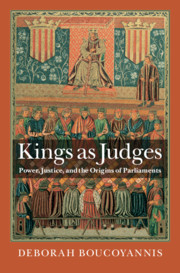Book contents
- Kings as Judges
- Kings as Judges
- Copyright page
- Contents
- Figures
- Tables
- Preface and Acknowledgments
- Part I The Origins of Representative Institutions: Power, Land, and Courts
- Part II The Origins of Representative Practice: Power, Obligation, and Taxation
- Part III Trade, Towns, and the Political Economy of Representation
- Part IV Land, Conditionality, and Property Rights
- 10 Power, Land, and Second-Best Constitutionalism: Central and Northern Europe
- 11 Conditional Land Law, Property Rights, and “Sultanism”: Premodern English and Ottoman Land Regimes
- 12 Land, Tenure, and Assemblies: Russia in the Sixteenth and Seventeenth Centuries
- Part V Why Representation in the West: Petitions, Collective Responsibility, and Supra-Local Organization
- Bibliography
- Index
12 - Land, Tenure, and Assemblies: Russia in the Sixteenth and Seventeenth Centuries
from Part IV - Land, Conditionality, and Property Rights
Published online by Cambridge University Press: 18 June 2021
- Kings as Judges
- Kings as Judges
- Copyright page
- Contents
- Figures
- Tables
- Preface and Acknowledgments
- Part I The Origins of Representative Institutions: Power, Land, and Courts
- Part II The Origins of Representative Practice: Power, Obligation, and Taxation
- Part III Trade, Towns, and the Political Economy of Representation
- Part IV Land, Conditionality, and Property Rights
- 10 Power, Land, and Second-Best Constitutionalism: Central and Northern Europe
- 11 Conditional Land Law, Property Rights, and “Sultanism”: Premodern English and Ottoman Land Regimes
- 12 Land, Tenure, and Assemblies: Russia in the Sixteenth and Seventeenth Centuries
- Part V Why Representation in the West: Petitions, Collective Responsibility, and Supra-Local Organization
- Bibliography
- Index
Summary
Russia provides the final testing ground for the concept of conditionality. This chapter shows how the limited incidents of representation in sixteenth and seventeenth-century Russia can be explained through the conditional rights to land granted to the lower nobility in order to counter the strength of the upper nobility, the boyars. This makes Russia another case of "second-best-constitutionalism." At that level, it displayed striking similarities to patterns observed in England, leading to the conclusion that the two cases differed not in the institutions that were being created but in the capacity of the state to enforce them. This position is at odds with common conceptions of the Russian tsar as all-powerful, so the chapter offers evidence to counter this assumption. It examines the weak control over the boyars, the limited taxing capabilities, and the mass enserfment of peasants to show how they either reflect or result from state weaknesses. The chapter then describes how these conditions interacted with the emergence of representation in Russia, as well as how they explain its demise.
Keywords
- Type
- Chapter
- Information
- Kings as JudgesPower, Justice, and the Origins of Parliaments, pp. 252 - 272Publisher: Cambridge University PressPrint publication year: 2021



